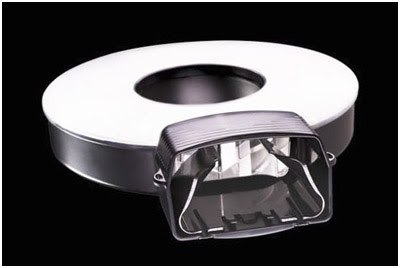Orbis is Going Away. Grab One (for Cheap) While You Can.
(UPDATE: You missed it. The close-out sale is gone. We have now moved onto the price-gouging portion of our show. Don't bite. Much better to buy used on eBay. These things are near indestructible. If it is not visibly damaged, you can feel pretty safe buying used.)
__________
For those of you late to the party, the Orbis Ring Flash Adpater is a passive, add-on light shaping device that turns your speedlight into a ring flash. There are others, but for a slew of reasons the Orbis has long been my favorite of the lot.
And it is about to go away forever. This post is a quick heads-up to grab one while you can—and a pointer to a fantastic deal on the last units as they are closed out.
The Orbis was developed in 2008 as a sophisticated answer to the DIY efforts of the Strobist community. After seeing what was possible with cereal boxes, aluminum foil and gaffer's tape, reader James Madelin wanted to build something better. Meaning nicer looks, better durability, more efficiency, more color correct and with a better quality of light. So that's exactly what he did.
The Orbis is surprisingly complex on the inside in the way it bends light around the donut. It strikes the balance between lighting efficiency vs. evenness (both being very important) just about as well as possible.
Interestingly, of all of the best ring flash adapters, the Orbis was the only one that was never knocked off by the shady Chinese photo gear copiers. It's not that they never thought of it. Lord knows, they put out crap versions of all the others.
My guess? They cut one open, took a look inside and said, "Eff this. Let's knock off the Ray Flash instead."
What it Will Do
The Orbis Ring Flash Adapter is not a flash. It is a passive light mod that mounts onto your existing speedlight. And you'll still need to sync your flash, just like any other off-camera light. For run-and-gun, a coiled off-camera shoe cord will do fine. For use as fill (see below) in a more typical portrait shoot, I just stick mine on a stand and shoot through it, usually triggering it via slave from the key light.
Used alone, on-axis (classic ring light position) it creates that signature glam ring light look as seen above. And because it retains any TTL functions of the speedlight crammed into it, the Orbis is very popular with club/event photographers. Stick on a wideangle lens, work two stops over the ambient in TTL mode, and the results look cool as crap.
And that's fine for event shooters. But I prefer to use mine more in a way inspired by portrait shooters like Greg Heisler and Dan Winters.
In this mode, the Orbis becomes a very sophisticated fill light. You can use it in combo with another off-camera speedlight acting as key light, and it fills in the gaps—to whatever level you choose based on how you power it.
The photo above of poet Linda Joy Burke is a good example. The key light is coming from upper left. I am working well above the ambient with my flash exposure. So Linda's shadow side would be very, very dark without the Orbis that is wrapped around my lens.
The light from the orbis reaches into the shadow side without really adding any footprint, and creates legibility. How much? Your choice. Just dial the power of the ring-fill light up or down as much as you want.
This is a common way for portrait photographers to create exactly the amount of legibility they want in the shadows. Which means you can get more creative and/or edgy with your key if you want. 'Cause the ring is gonna save your ass in the shadows.

Same here with this photo of blogger Sian Meades, done in London. I am in full shade here, and this light is completely being created with two speedlights.
The key light is at hard left, raking across Sian's face. The fill light, in an Orbis, stuck right on my lens, is creating the legibility in the shadows of the key.
The ambient component here is minimal. Without the flashes the photo would be near black. The on-axis Orbis gives me complete control of my shadow density.
(To learn more about lighting either of these two photos, click on either one.)
Now or Never
And the Orbis will soon be gone forever.
They sold over the last seven years for $200, rarely if ever discounted. But the remaining units are being closed out for $129 (w/free shipping in US.) Or you can get it with the hands-free arm for $139 (+$7.40 shipping in US.)
This is a great deal. Because not only will it work on nearly any speedlight (but not bigass Vivitar 285s, sorry) it is built to last you likely for the rest of your shooting life.
Which is a good thing, because you're not gonna be able to replace it.
__________
(UPDATE: The close-out sale is gone. We have now moved onto the price-gouging portion of our show. Don't bite. Much better to buy used on eBay. These things are near indestructible. If it is not visibly damaged, you can feel pretty safe buying used.)
Amazon: Orbis Closeout: $129, free ship US (Gone)
Amazon: Orbis Ring Flash Adapter w/Arm: $139 + $7.40 ship US (Gone)
__________
For those of you late to the party, the Orbis Ring Flash Adpater is a passive, add-on light shaping device that turns your speedlight into a ring flash. There are others, but for a slew of reasons the Orbis has long been my favorite of the lot.
And it is about to go away forever. This post is a quick heads-up to grab one while you can—and a pointer to a fantastic deal on the last units as they are closed out.
The Orbis was developed in 2008 as a sophisticated answer to the DIY efforts of the Strobist community. After seeing what was possible with cereal boxes, aluminum foil and gaffer's tape, reader James Madelin wanted to build something better. Meaning nicer looks, better durability, more efficiency, more color correct and with a better quality of light. So that's exactly what he did.
The Orbis is surprisingly complex on the inside in the way it bends light around the donut. It strikes the balance between lighting efficiency vs. evenness (both being very important) just about as well as possible.
Interestingly, of all of the best ring flash adapters, the Orbis was the only one that was never knocked off by the shady Chinese photo gear copiers. It's not that they never thought of it. Lord knows, they put out crap versions of all the others.
My guess? They cut one open, took a look inside and said, "Eff this. Let's knock off the Ray Flash instead."
What it Will Do
The Orbis Ring Flash Adapter is not a flash. It is a passive light mod that mounts onto your existing speedlight. And you'll still need to sync your flash, just like any other off-camera light. For run-and-gun, a coiled off-camera shoe cord will do fine. For use as fill (see below) in a more typical portrait shoot, I just stick mine on a stand and shoot through it, usually triggering it via slave from the key light.
Used alone, on-axis (classic ring light position) it creates that signature glam ring light look as seen above. And because it retains any TTL functions of the speedlight crammed into it, the Orbis is very popular with club/event photographers. Stick on a wideangle lens, work two stops over the ambient in TTL mode, and the results look cool as crap.
And that's fine for event shooters. But I prefer to use mine more in a way inspired by portrait shooters like Greg Heisler and Dan Winters.
In this mode, the Orbis becomes a very sophisticated fill light. You can use it in combo with another off-camera speedlight acting as key light, and it fills in the gaps—to whatever level you choose based on how you power it.
The photo above of poet Linda Joy Burke is a good example. The key light is coming from upper left. I am working well above the ambient with my flash exposure. So Linda's shadow side would be very, very dark without the Orbis that is wrapped around my lens.
The light from the orbis reaches into the shadow side without really adding any footprint, and creates legibility. How much? Your choice. Just dial the power of the ring-fill light up or down as much as you want.
This is a common way for portrait photographers to create exactly the amount of legibility they want in the shadows. Which means you can get more creative and/or edgy with your key if you want. 'Cause the ring is gonna save your ass in the shadows.

Same here with this photo of blogger Sian Meades, done in London. I am in full shade here, and this light is completely being created with two speedlights.
The key light is at hard left, raking across Sian's face. The fill light, in an Orbis, stuck right on my lens, is creating the legibility in the shadows of the key.
The ambient component here is minimal. Without the flashes the photo would be near black. The on-axis Orbis gives me complete control of my shadow density.
(To learn more about lighting either of these two photos, click on either one.)
Now or Never
And the Orbis will soon be gone forever.
They sold over the last seven years for $200, rarely if ever discounted. But the remaining units are being closed out for $129 (w/free shipping in US.) Or you can get it with the hands-free arm for $139 (+$7.40 shipping in US.)
This is a great deal. Because not only will it work on nearly any speedlight (but not bigass Vivitar 285s, sorry) it is built to last you likely for the rest of your shooting life.
Which is a good thing, because you're not gonna be able to replace it.
__________
(UPDATE: The close-out sale is gone. We have now moved onto the price-gouging portion of our show. Don't bite. Much better to buy used on eBay. These things are near indestructible. If it is not visibly damaged, you can feel pretty safe buying used.)





Komentar
Posting Komentar